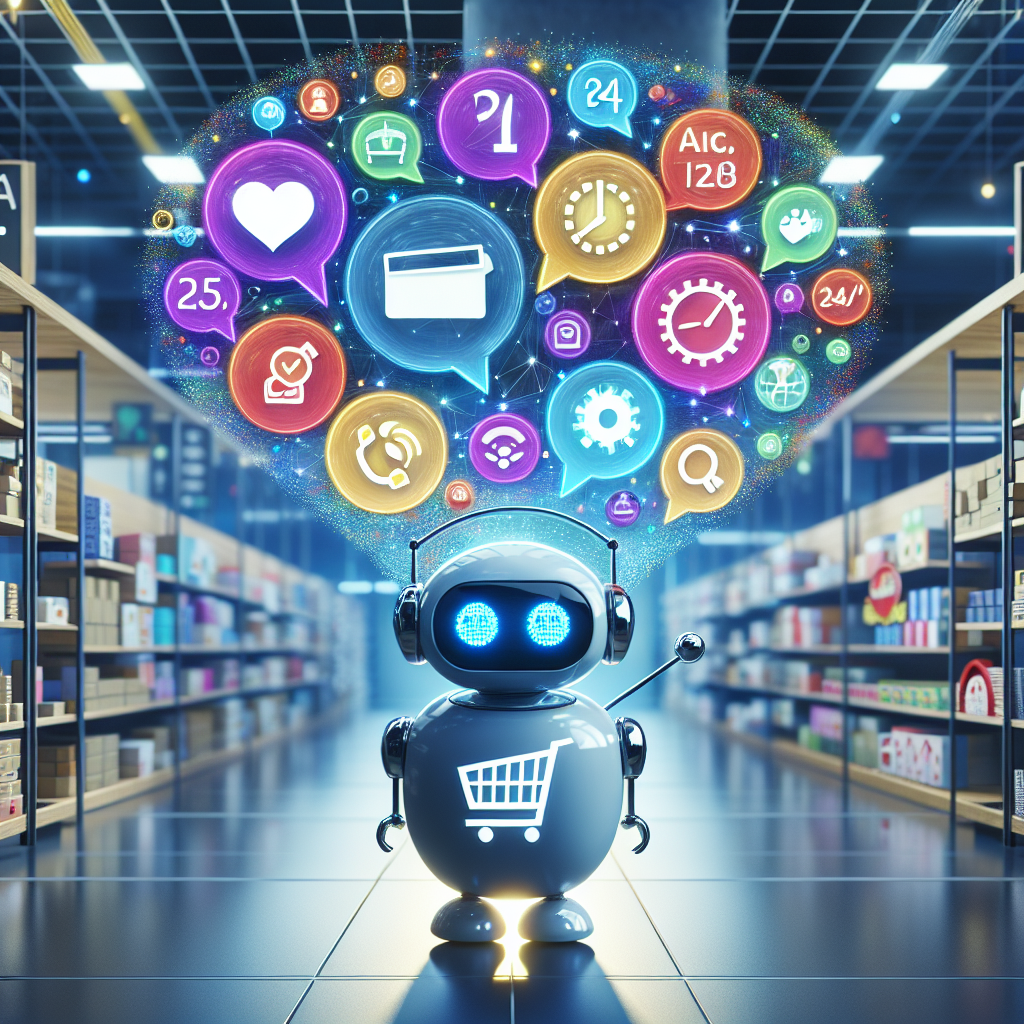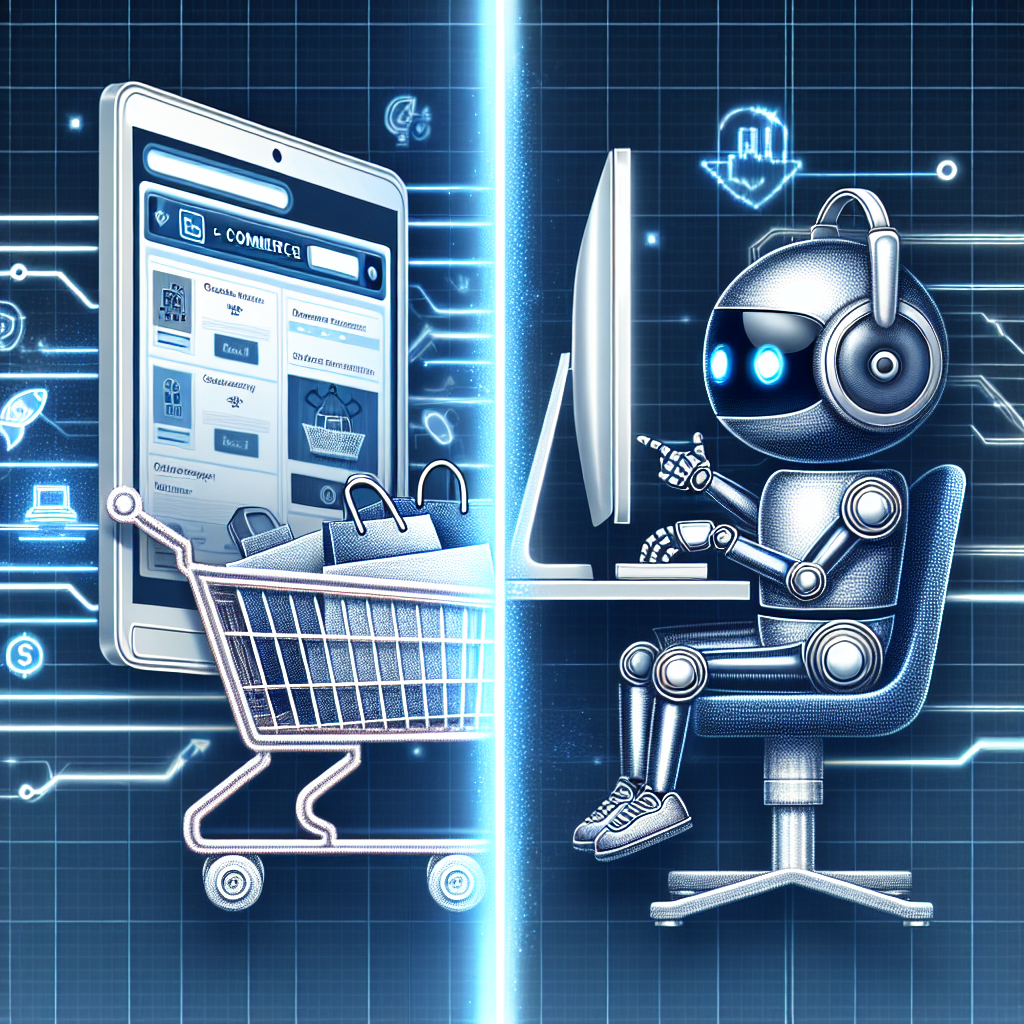In the ever-evolving world of e-commerce, the role of customer support has taken a revolutionary turn with the implementation of chatbots. These advanced AI-driven conversational agents are changing the game by providing instant assistance to customers, answering queries, and resolving issues in real-time. This technological innovation has not only streamlined the customer support process but has also improved overall user experience, leading to increased customer satisfaction and loyalty. Join us as we delve into the power of chatbots and uncover how they are transforming the landscape of customer support in e-commerce, making interactions faster, more efficient, and downright extraordinary.
Understanding Chatbots in E-commerce
Chatbots in e-commerce refer to artificial intelligence (AI) programs designed to simulate conversations with customers to provide assistance, answer inquiries, and offer personalized recommendations within the online shopping environment.
Definition of Chatbots in the Context of E-commerce
Chatbots are computer programs that utilize natural language processing (NLP) and machine learning algorithms to understand and respond to user queries in a conversational manner. In the realm of e-commerce, chatbots are integrated into websites or messaging platforms to engage with customers, streamline the shopping experience, and enhance customer support services.
Evolution of Chatbots in Customer Support
The evolution of chatbots in customer support within the e-commerce sector has been marked by advancements in AI technology, enabling chatbots to offer more sophisticated interactions with users. Initially serving basic functions like providing automated responses to frequently asked questions, chatbots have evolved to handle complex queries, offer product recommendations based on user preferences, and even facilitate transactions directly through chat interfaces.
Benefits of Implementing Chatbots in E-commerce
- 24/7 Availability: Chatbots enable e-commerce businesses to provide round-the-clock customer support, catering to the needs of global audiences across different time zones.
- Efficiency: By automating responses to common queries and tasks, chatbots help streamline customer interactions, reducing wait times and enhancing overall service efficiency.
- Personalization: Through data analysis and machine learning algorithms, chatbots can deliver personalized recommendations to users based on their browsing history, purchase behavior, and preferences.
- Scalability: Chatbots can handle multiple customer inquiries simultaneously, allowing businesses to scale their customer support operations without significantly increasing staffing costs.
In conclusion, chatbots have emerged as powerful tools in revolutionizing customer support in e-commerce, offering businesses the opportunity to enhance user experiences, increase operational efficiency, and drive sales through personalized interactions.
Types of Chatbots for Customer Support

Rule-Based Chatbots
Rule-based chatbots in e-commerce are designed to follow a set of predefined rules and responses based on keywords or phrases entered by the user. These chatbots operate within a limited framework and can provide scripted responses to common customer queries.
Pros of Rule-Based Chatbots in E-commerce:
– Cost-Effective: Rule-based chatbots are relatively easy and inexpensive to set up compared to more advanced AI-powered chatbots.
– Consistent Responses: These chatbots ensure that customers receive consistent and accurate information, reducing the risk of errors in customer support interactions.
– Easy Implementation: Implementing rule-based chatbots does not require complex algorithms or machine learning capabilities, making them accessible to small and medium-sized e-commerce businesses.
Cons of Rule-Based Chatbots in E-commerce:
– Limited Flexibility: Rule-based chatbots may struggle to handle complex or unique customer queries that fall outside their predefined rules.
– Lack of Personalization: These chatbots may provide generic responses that do not cater to the individual preferences or needs of customers.
– Maintenance Challenges: Updating and maintaining the rules of a chatbot can be time-consuming, especially as the e-commerce business grows and customer queries become more diverse.
AI-Powered Chatbots
Types of Chatbots for Customer Support
- Overview of AI-powered chatbots
- AI-powered chatbots are advanced virtual assistants that utilize artificial intelligence algorithms to interact with customers in a personalized and efficient manner.
- These chatbots are designed to understand natural language processing and machine learning to provide accurate responses and solutions to customer queries.
- How AI enhances customer support in e-commerce
- AI-powered chatbots have the ability to handle a large volume of customer inquiries simultaneously, ensuring prompt responses and reducing wait times for customers.
- By analyzing customer data and interactions, AI chatbots can offer personalized recommendations and solutions, enhancing the overall shopping experience.
- The predictive capabilities of AI enable chatbots to anticipate customer needs, proactively offering assistance and guiding them through the purchasing process.
- Examples of successful AI-powered chatbots in e-commerce
- One prominent example is the chatbot deployed by clothing retailer H&M, which uses AI to provide styling tips, outfit suggestions, and product recommendations based on customer preferences.
- Another successful AI chatbot is Sephora’s Virtual Artist, which utilizes AI-powered technology to allow customers to try on makeup virtually, enhancing the online shopping experience and increasing customer satisfaction.
Implementing Chatbots in E-commerce
In the realm of e-commerce, the integration of chatbots has emerged as a transformative tool in enhancing customer support services. By harnessing the power of artificial intelligence and natural language processing, chatbots have the potential to revolutionize the way businesses interact with their customers. However, before embarking on the implementation of chatbots in e-commerce, several crucial factors must be carefully considered to ensure a seamless integration and optimal performance.
Factors to consider before implementing chatbots
- Understanding Customer Needs: Prior to deploying chatbots, e-commerce businesses must conduct a thorough analysis of their customer support requirements to identify the specific pain points that chatbots can address effectively.
- Technology Compatibility: Assessing the compatibility of existing systems and platforms with chatbot integration is essential to avoid potential technical challenges during implementation.
- Data Security and Privacy: Safeguarding customer data and ensuring compliance with data protection regulations are paramount considerations when implementing chatbots in e-commerce.
- Scalability: Evaluating the scalability of chatbot solutions is crucial to accommodate future growth and evolving customer support needs.
- User Experience Enhancement: Chatbots should be designed with a user-centric approach to enhance customer experience and streamline interactions.
Steps to integrate chatbots into the e-commerce platform
- Selecting the Right Chatbot Platform: Choosing a chatbot platform that aligns with the specific requirements of the e-commerce business is a foundational step in the integration process.
- Customizing Chatbot Features: Tailoring chatbot functionalities to meet the unique needs of the e-commerce platform ensures seamless integration and optimal performance.
- Integrating with CRM Systems: Connecting chatbots with customer relationship management systems enables personalized interactions and enhances customer engagement.
- Testing and Optimization: Conducting thorough testing and continuous optimization of chatbot performance is essential to refine responses and enhance overall user experience.
- Training Chatbots: Providing comprehensive training data and continuous learning opportunities for chatbots is crucial to improve their accuracy and efficiency in addressing customer queries.
Training chatbots for optimal customer support performance
- Natural Language Processing Training: Training chatbots to understand and respond to natural language queries accurately is essential for delivering effective customer support.
- Machine Learning Algorithms: Leveraging machine learning algorithms to analyze customer interactions and improve chatbot responses over time enhances their performance.
- Feedback Loop Implementation: Establishing a feedback loop mechanism to gather insights from customer interactions enables continuous refinement of chatbot capabilities and enhances customer satisfaction.
- Monitoring and Performance Analysis: Regularly monitoring chatbot performance metrics and analyzing customer feedback allows for adjustments and enhancements to optimize their customer support capabilities.
Enhancing Customer Experience with Chatbots
Chatbots have transformed the landscape of customer support in e-commerce by offering a personalized experience tailored to each user’s needs. Through advanced algorithms and machine learning capabilities, chatbots can analyze customer preferences, purchase history, and browsing behavior to provide customized recommendations and assistance. This level of personalization creates a sense of individualized attention that fosters customer loyalty and satisfaction.
Personalization through chatbots
By leveraging data analytics and artificial intelligence, chatbots can engage customers in meaningful conversations that address their specific inquiries and concerns. These interactions mimic human-like responses, making customers feel understood and valued. Whether offering product recommendations based on past purchases or providing real-time order updates, chatbots enhance the overall shopping experience by catering to each customer’s unique requirements.
24/7 customer support availability
One of the key advantages of chatbots in e-commerce is their round-the-clock availability. Unlike traditional customer support channels that operate within specific hours, chatbots can assist customers at any time of the day or night. This instant access to support ensures prompt resolution of issues, minimizes wait times, and maximizes customer satisfaction. Whether a customer needs assistance with a purchase, has a question about a product, or requires help with returns, chatbots are always ready to provide immediate support.
Streamlining the customer journey with chatbots
Chatbots play a crucial role in streamlining the customer journey by guiding users through the entire purchasing process. From initial product discovery to post-sale support, chatbots offer seamless assistance at every touchpoint. By proactively engaging customers, recommending relevant products, and addressing concerns in real-time, chatbots eliminate friction points and enhance the overall shopping experience. This streamlined approach not only increases conversion rates but also fosters long-term customer relationships based on trust and efficiency.

Challenges and Solutions in Chatbot Implementation
Data Privacy and Security Concerns
hallenges and Solutions in Chatbot Implementation
Chatbots have revolutionized customer support in e-commerce, but their implementation raises critical concerns regarding data privacy and security. Ensuring that customer data is handled with utmost confidentiality is paramount in maintaining trust and compliance with regulations. Here are the key aspects to consider:
- Addressing customer data privacy issues:
- Implementing robust data encryption protocols to safeguard sensitive information shared during interactions with chatbots.
- Obtaining explicit consent from customers before collecting any personal data and clearly outlining how it will be used.
- Regularly auditing data handling processes to identify and address any vulnerabilities that could compromise privacy.
- Ensuring secure interactions with chatbots:
- Integrating multi-factor authentication mechanisms to verify the identity of users before accessing certain information.
- Monitoring chatbot conversations in real-time to detect any suspicious activities or unauthorized data access.
- Collaborating with cybersecurity experts to conduct penetration testing and vulnerability assessments to fortify chatbot systems against potential breaches.
Handling Complex Customer Inquiries
Chatbots have significantly enhanced customer support in e-commerce, yet they face challenges in handling complex inquiries efficiently. To address this, strategies have been developed to improve their performance:
- Natural Language Processing (NLP) Integration: By incorporating advanced NLP capabilities, chatbots can better understand the nuances of complex customer inquiries, leading to more accurate responses.
- Machine Learning Algorithms: Leveraging machine learning algorithms allows chatbots to continuously learn from interactions, enabling them to handle increasingly complex queries over time.
- Escalation Protocols: Implementing escalation protocols ensures that when a chatbot encounters a query beyond its capabilities, it seamlessly transfers the conversation to a human agent for personalized assistance.
- Hybrid Model Integration: Combining chatbots with human support in a hybrid model provides a balance between automation and human touch, offering customers quick responses while ensuring complex issues are resolved effectively.

– Contextual Understanding: Enhancing chatbots with contextual understanding capabilities enables them to maintain the flow of conversation and provide relevant solutions to intricate inquiries based on previous interactions.
Future Trends in Chatbots for E-commerce
- Predictions for the future of chatbots in e-commerce
As we look ahead, the future of chatbots in e-commerce appears to be increasingly dynamic and sophisticated. One key prediction is the integration of chatbots with voice assistants like Alexa and Google Assistant, enabling customers to engage with brands seamlessly through voice commands. Additionally, chatbots are expected to become more personalized, leveraging data analytics and machine learning to tailor responses to individual customer preferences and behaviors. The rise of omnichannel communication is also anticipated, where chatbots will seamlessly transition across various platforms such as websites, social media, and messaging apps to provide a consistent customer experience.
- Advancements in AI technology shaping the future of customer support
The rapid advancements in AI technology are set to redefine the landscape of customer support in e-commerce. Chatbots powered by natural language processing (NLP) are becoming increasingly adept at understanding and responding to complex customer queries, mimicking human-like conversations with greater accuracy. Machine learning algorithms are enabling chatbots to continuously learn from interactions and improve their responses over time, leading to more efficient and effective customer service. Furthermore, the integration of chatbots with data analytics tools is enabling businesses to gain valuable insights into customer preferences and behaviors, allowing for more targeted and personalized support.
- The role of chatbots in the evolution of e-commerce customer service
Chatbots are playing a pivotal role in the evolution of e-commerce customer service by providing round-the-clock support, instant responses, and personalized interactions. As customer expectations continue to rise, chatbots are bridging the gap between businesses and consumers by delivering real-time assistance and guidance throughout the customer journey. The seamless integration of chatbots within e-commerce platforms is enhancing the overall shopping experience, reducing response times, and increasing customer satisfaction. In the future, chatbots are poised to become integral to e-commerce operations, serving as valuable assets in driving sales, building customer loyalty, and staying ahead of the competition.
FAQs implementing chatbots for customer support in ecommerce
How can chatbots benefit e-commerce businesses in customer support?
Chatbots can benefit e-commerce businesses in customer support by providing 24/7 assistance to customers, handling a large volume of inquiries simultaneously, and offering personalized solutions based on customer data. They can also streamline the customer service process, improve response times, and reduce operational costs for businesses.
Are chatbots capable of handling complex customer queries?
Yes, chatbots can be programmed to handle complex customer queries by using Natural Language Processing (NLP) and Artificial Intelligence (AI) technologies. Chatbots can analyze and understand the context of a conversation to provide accurate and relevant responses to customers, even for complicated inquiries.
How can e-commerce businesses ensure that chatbots provide a positive customer experience?
To ensure that chatbots provide a positive customer experience, e-commerce businesses should regularly monitor and update their chatbots to improve accuracy and efficiency. It is essential to train chatbots with relevant and up-to-date information, set clear expectations for customers regarding the capabilities of the chatbot, and offer a seamless transition to human support when needed.
Can chatbots help e-commerce businesses increase sales and revenue?
Yes, chatbots can help e-commerce businesses increase sales and revenue by providing personalized product recommendations, assisting customers with their purchasing decisions, and offering real-time support during the checkout process. Chatbots can also help businesses upsell and cross-sell products, leading to a higher average order value and improved conversion rates.
How secure are chatbots in handling sensitive customer information?
Chatbots can be secure in handling sensitive customer information by implementing robust encryption protocols, adhering to data protection regulations, and regularly updating security measures. E-commerce businesses can also limit the types of information that chatbots can access and store, ensuring that customer data remains confidential and protected from potential cyber threats.